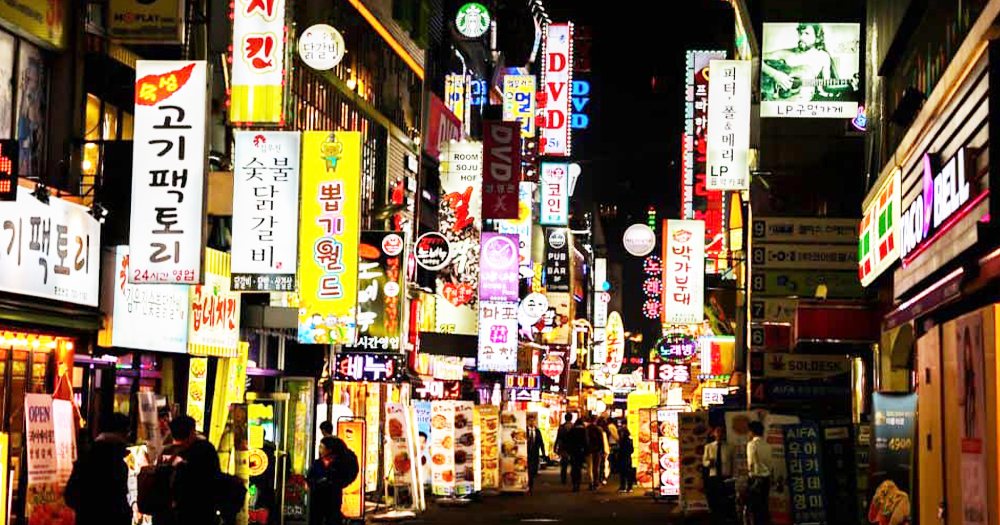Shinjuku Ni-chōme, known colloquially as Ni-chōme or Nichō, is the certified gaybourhood of Tokyo city. Situated in the capital’s noisiest and busiest district, Shinjuku, the LGBTQ+ hub hosts the highest concentration of gay bars in the world.
Spanning across five blocks, there are an estimated 300 gay bars and nightclubs neighboured by cafes, saunas, video stores, book shops, and more, all catering to queer clientele. The area boasts a unique culture and history, and a night out here is far from what you’d find at Thirsty Thursdays in The George.
The emergence of Ni-chōme as a gay neighbourhood can be dated back to the 1940’s during the American occupation of Japan following World War II. From as early as 1948, there is mention of a gay tea shop in the area, and in the subsequent decade, exclusively gay bars began to open up and show their colours. The scene’s establishment can also be linked to the closure of Tokyo’s red-light district as a consequence of the 1956 Prostitution Prevention Law. Prior to this, the capital housed legally-licensed centres for sex workers, and as the industry shut down, a gay subculture arose in its place.
The bars are incredibly unique in that most only hold up to a dozen customers, and there are none with a capacity of over 100. Because of this, it is extremely common that they will only aim to attract a specific queer subset, with the club owners, or ‘Mamas’, holding the power to refuse or grant entry.
Bars are separated by scene ranging from BDSM, to bears, to butch lesbians, to femmes… the list truly goes on and on. Mamas will go as far as charging people outside of their target market a higher entry fee in order to deter them from their establishment.
It can be difficult for foreign customers to be accepted into the small bars as owners favour business from their Japanese counterparts. In many venues, you are seated at the counter and engage in conversation with the bartender, so those who can establish good relationships with the owner will be welcomed back time and time again. If you are a regular, you can avail of the bottle-keep service, along with being invited to attend bar-organised outings. If you aren’t a native, there are bars in Ni-chōme that target foreign tourists. These are easily identified due to their English advertisements and names such as Advocates, Arty Farty, and Dragon Men.

As well as the usual gay and lesbian bars, you can also find host bars where legal prostitution occurs, cruising boxes, video and book stores, cafes, massage parlours, and saunas. The largest sauna in the area, 24 Kaikan, is eight-floors tall and features a dry sauna, steam room, jacuzzi, solarium, video room, private cabins, and a rooftop lounge with a plunge pool.
While Japan is one of the more queer-friendly nations in Asia, it can still be difficult for its LGBTQ+ citizens to fully express themselves. Traditionally speaking, Japanese people are quite conservative, and when it comes to things like sexuality, many believe that it is a matter that should be dealt with and expressed in private. This results in a lack of LGBTQ+ visibility and makes it harder for Japanese people to come out and live openly gay lives.
Reportedly, there are still many queer folk who marry into heterosexual relationships due to feeling incapable of pursuing same-sex partnerships. This amplifies the need for places like Ni-chōme, which offers the Tokyo community a welcoming space to fully express themselves, while still celebrating Japanese etiquette and culture.
© 2021 GCN (Gay Community News). All rights reserved.
Support GCN
GCN is a free, vital resource for Ireland’s LGBTQ+ community since 1988.
GCN is a trading name of National LGBT Federation CLG, a registered charity - Charity Number: 20034580.
GCN relies on the generous support of the community and allies to sustain the crucial work that we do. Producing GCN is costly, and, in an industry which has been hugely impacted by rising costs, we need your support to help sustain and grow this vital resource.
Supporting GCN for as little as €1.99 per month will help us continue our work as Ireland’s free, independent LGBTQ+ media.

comments. Please sign in to comment.